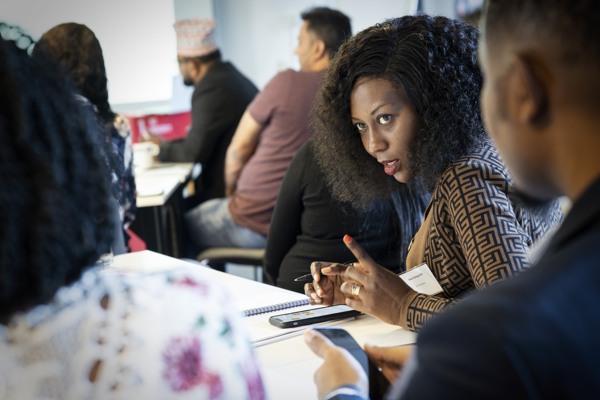The programme
This is a leadership programme that focuses on sustainable development according to Agenda 2030. It takes a holistic approach that is relevant to all 17 sustainability goals. The programme aims to train leaders who are capable of driving social, economic, and environmental sustainability at the system level.
Leadership for Transformative Change offers you an opportunity to develop a current sustainability development activity through leadership development and organisational development. You will design your own business development process and in this process increase your ability to directly influence societal development processes. Every step of the way, you will be supported by scholars, other high-level tutors and your peer participants in the programme. The programme is built on a co-creation epistemology, where the participants' needs, ideas, and challenges are essential building blocks.
The programme provides leaders motivated for systems innovation and transformative change with novel adaptive approaches, innovative tools and critical frameworks. The programme supports the development and implementation of a business development process for ongoing sustainability development process.

Teamwork LTC group. Photo: Mikael Wallerstedt
Meet some of our trainers
Learn more about our contributing trainers in the programme.
More about the programme
The programme aims to enhance the participants' skills in various areas related to sustainability transformation processes. These areas include identifying personal and internal driving forces, understanding the interconnection between different sustainability goals and their relevance to ongoing sustainability work. Other areas are strategic communication, advocacy, opinion formation, and the ability to work with system analysis and development tools. The programme deepens the understanding of intersectionality and its role in sustainable development processes. The programme also provides knowledge and expertise to lead internal change processes within an organisation and develops the organisation's role in societal change processes. Additionally, the programme helps participants drive innovation processes, including through design thinking.
Also included is training on how to identify and analyse the connection between the organisation's operations and the sustainability goals. This may involve integrating sustainability goals into business strategies and decision-making.
Tools and methods to promote system changes are provided and participants will be trained on collaborating with various stakeholders, such as governments, civil society, and other businesses, to address common challenges and promote sustainable development at the system level.
There is an emphasis on the importance of developing leaders who are aware of and committed to social change. This includes training on ethical leadership, diversity, and inclusion, as well as how to build trusting relationships with communities and stakeholder groups to create positive change.
Integrating all these elements creates a world-class leadership programme and prepares participants to be drivers of sustainable development and societal change today and tomorrow.
Working with organisational development processes to contribute to increased ability to drive social innovation can benefit and disadvantage different groups. Equity and equality perspectives – intersectionality – are therefore central in this process. As a leader of transformative change, it is necessary to have knowledge of critical concepts and how they interlink as well as knowledge of contexts and their importance. You also need the skills to explore, reflect and critically evaluate your own experiences, attitudes, values, actions, and position(s) in relation to resources, status, power and current inequities. In other words, the key to leading transformational projects contributing to stronger societal impact for sustainable development need to be based on equity and equality perspectives.
To facilitate such personal development, the programme will dedicate time and intentionally focus on intersectional equality including looking at how gender, ethnicity, class, sex, religion, sexual orientation and other parts of one’s identity might shape one’s experience of and existence in the world. Taking on an intersectional approach includes considering how overlapping identities shape one’s access to power and privilege in different settings. We will also be sensitive to the positionality of you as a participant and of the people you may encounter through your transformation process, so as not to reproduce historical and current power structures that might even unintentionally contribute to the exclusion of particular groups and/or perspectives.
